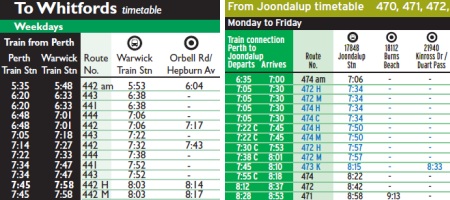Under BSRF, checkpoints in Transperth parlance
act like "timed stops":

"For example, I catch the bus every morning. It's supposed to
pick me up at 7:01am but it always comes at 6:56-6:58am, because
there's not much traffic at that time of the morning.
We zoom down the road and providing nobody gets on the bus (or
it only has to stop once or twice), the bus ends up becoming
another 1 or 2 minutes earlier than it should be.
Then when we get to a timed stop 5 minutes early, the bus stops
and waits there to use up all that extra time, which means the bus
should run on time for the next block of stops in between there and
the next timed stop."
This is practiced by TT Perth. Timed stops are published in
printed timetables, so passengers know the buses will arrive at
these fixed times:

BCM/GCM operators intend to adopt the same practice:
"The driver announces over the intercom: "Ladies and gentlemen,
the bus will be held at this stop for two minutes to regulate the
service."
This London scenario may soon become commonplace for bus users
in Singapore."
Checkpoints were already in place since the mid-2000s under SBS
Transit, but they were enforced
in a more subtle manner:
"When traffic conditions are especially clear,
our Bus Captains are required to regulate speed if they notice that
they are ahead of schedule. This ensures that the Bus Captains keep
the arrival times at the bus stops as close to the planned schedule
as possible to avoid any disruption like bus bunching."